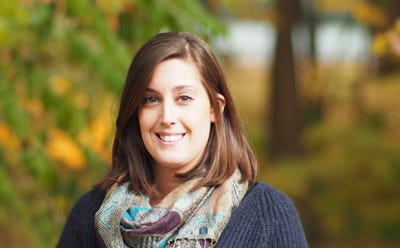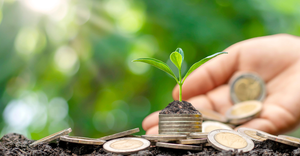Tim Hortons’ Yang Makes a Big Impact Early On
The Waste360 40 Under 40 award recipient discusses some of the roadblocks he has had to overcome, as well as the impact he hopes to make in the world.
At age 16, Paul Yang entered Queen’s University for mechanical engineering. At 19, he graduated with top honors.
In 2013, Yang joined Mother Parkers Tea & Coffee as a special projects engineer, where he helped the company successfully launch EcoCup capsules into the marketplace to overcome single-serve recycling challenges. EcoCup capsules allow consumers to completely disassemble the capsule, enabling recycling of the cup body, composting of the product and reducing the waste associated with single serve.
From there, Yang went on to lead packaging and equipment innovation within Tim Hortons’ global marketing team, where he continues to work today.
“Paul functions with one major operating principle that shapes the activities in his life: make a difference,” says Liberatore Trombetta, who Yang worked for at Mother Parkers. “Paul possesses a genuine and innate passion and perseverance to, wherever he can, do this. To many people, a job is just work. To Paul, his job is an opportunity to drive a change in society for the better—whether that is designing a product that enhances the life of a consumer or understanding and facilitating how that product would be managed downstream of a consumer, he looks for ways to inject positive incremental change and redefine what we know today.”
Earlier this year, at age 28, Yang was honored with a Waste360 40 Under 40 award for his accomplishments in the waste and recycling industry. He recently sat down with us to discuss some of the roadblocks he has had to overcome at such a young age, as well as the impact he hopes to make in the industry and in the world.
Waste360: You graduated college at age 19 when most people were in their sophomore year. Tell us about that, as well as how you started off your career in the waste and recycling industry.
Paul Yang: I skipped two grades very early on in my schooling. It wasn’t easy, and I had a number of folks tell me that I’d never make it, or I’d never fit in. Long story short, I had to really learn to believe in myself; if you don’t, nobody else is going to. I was blessed to have a lot of positive influences around me through the years, which helped me assimilate quickly to my environments and “grow up quick.”
In 2013, I was tasked with shaping the sustainability agenda for the single-serve business at Mother Parkers Tea & Coffee. This was my immersion into the waste and recycling industry. I attended a lot of sustainability-related conferences across North America and Europe. Each one was used as a focus group to learn about the waste, recycling and composting industries. I was looking to figure out:
What is the current landscape (infrastructure, technology, policy)?
How do these industries work (business models, post-consumer value chain)?
What does the future look like (product and material innovations, equipment innovations, legislation changes)?
Waste360: Tell us about your current role in global innovation and sustainability at Tim Hortons.
Paul Yang: I lead packaging and equipment innovation at Tims within the global marketing team. We develop really cool products, and it’s all about making sure that we deliver the best experiences to our guests through packaging, equipment and process while being mindful of the resources we are using.
Waste360: What are EcoCup capsules? And how were you involved in their development and design process?
Paul Yang: EcoCup capsules are single-serve capsules that deliver a high-quality beverage experience while allowing consumers to completely disassemble the capsule post-use—enabling recycling of the cup body, composting of the product and reducing the waste associated with single serve.
I worked with many industry leaders across the post-consumer value chain (industry, government and municipalities) to understand their needs and to integrate these into packaging/product design of the EcoCup capsules.
Waste360: What are some of the roadblocks you’ve faced throughout your career?
Paul Yang: When you are trying to innovate, you encounter a lot of people who will tell you “no” and that things are not possible. Making sure that you don’t fall into the trap of believing this is super important. One of my mentors used to tell me that “walls don’t exist, we put up our own barriers; don’t stop before you start.”
Waste360: Can you give us an overview of the Queen’s Young Engineering Alumni (QYEA) organization and your role as co-chairman?
Paul Yang: QYEA helps young alumni engage in professional development/networking opportunities and drives fundraising to give back to the next generations of engineers. The team curates incredible events at really cool companies—everything from startups to large corporations across a wide variety of sectors, including tech, energy, infrastructure, manufacturing and consumer goods. In the past couple years, we’ve donated more than $80,000 back to student design teams and initiatives through a unique dragons’ den-style event. I now sit on the advisory board, helping the team build the strategic plan for continued growth.
Waste360: You’ve received numerous accolades and awards. Are there any that are especially noteworthy or personal for you?
Paul Yang: Tough one … it’s really hard to pick one. The awards are really a culmination of a lot of great work from many individuals.
Waste360: What does success mean to you—both on a personal level and in your career?
Paul Yang: Success for me is all about impact. I want to be able to leave a big impact. I really believe that it’s not good enough to be a very talented individual. For me, it’s really important to use my skillsets to drive a meaningful impact in the world—leaving the world in a better place than we found it.
About the Author
You May Also Like




